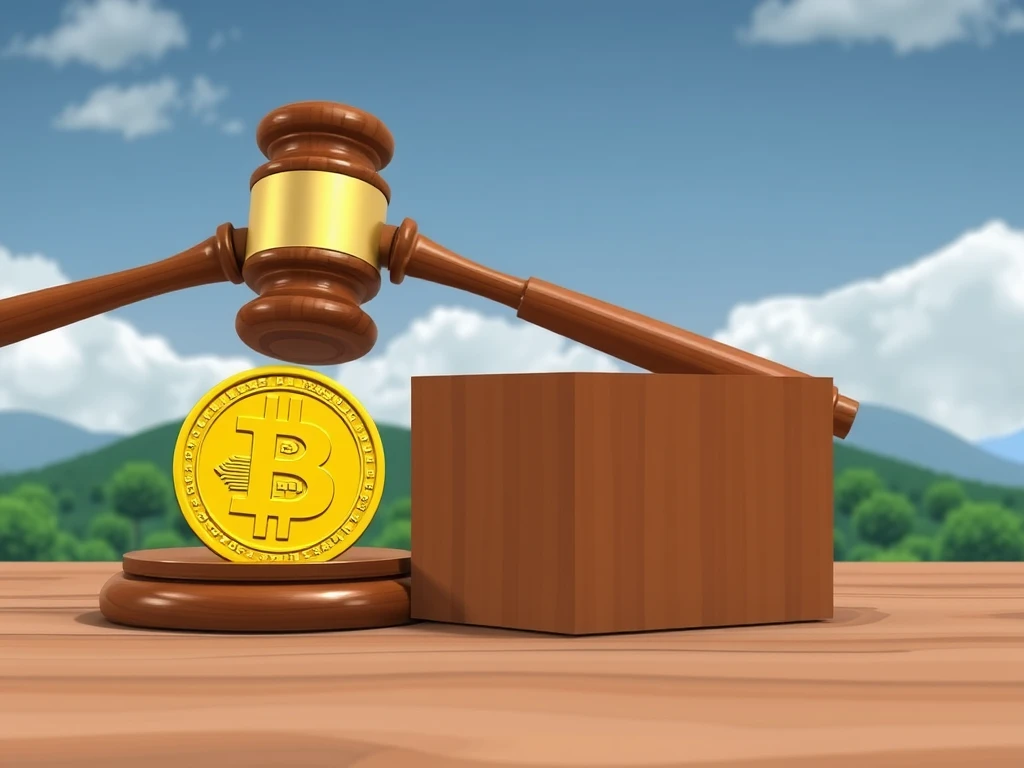Kalshi’s Bold Fight: Sues Gaming Regulators in Crypto Prediction Market Clash

The crypto world is buzzing as prediction market platform Kalshi takes a defiant stand against state regulatory overreach. In a move that could redefine the boundaries of crypto and gaming law, Kalshi has launched a lawsuit against gaming regulators in Nevada and New Jersey. Why? Because these states have issued cease and desist orders targeting Kalshi’s sports-related event contracts. Let’s dive into this high-stakes legal battle and understand what it means for the future of crypto prediction markets.
Why is the Kalshi Lawsuit a Landmark Case for Prediction Markets?
At the heart of the matter is Kalshi’s argument: their event contracts are not gambling. They are, Kalshi contends, legitimate financial instruments that offer traders a way to hedge against market risks. This distinction is crucial. If Kalshi is successful, it could set a precedent for how prediction markets are regulated across the United States, potentially paving the way for broader acceptance and growth of this innovative financial tool within the crypto space.
Here’s a breakdown of Kalshi’s key arguments in the Kalshi lawsuit:
- CFTC Jurisdiction: Kalshi asserts that because its contracts function as swaps and are traded on a designated contract market, they fall squarely under the jurisdiction of the Commodities Futures Trading Commission (CFTC). This federal oversight, they argue, preempts state-level regulation by gaming regulators.
- Two-Sided Market vs. Sports Betting: Unlike traditional sports betting where the house sets the odds and controls the market, Kalshi emphasizes its platform operates as a two-sided market. This means prices are determined by supply and demand, reflecting a genuine market consensus rather than a bookmaker’s edge.
- Legality of Election Contracts: Adding fuel to the fire, Kalshi points to a recent US judge’s ruling in September 2024 that deemed their election contracts legal. Nevada’s cease and desist order also targets these very election contracts, seemingly contradicting federal judicial opinion.
Tarek Mansour, Kalshi’s co-founder, didn’t mince words, stating, “Prediction markets are a critical innovation of the 21st century, and like all innovations, they are initially misunderstood. We are proud to be the company that has pioneered this technology and stand ready to defend it once again in a court of law.” This bold statement underscores Kalshi’s commitment to fighting for the legitimacy of prediction markets and their place within the financial ecosystem.
What Role Does the CFTC Play in Crypto Regulation and This Lawsuit?
The CFTC’s stance is pivotal in this legal drama. Interestingly, just days before the Kalshi lawsuit gained momentum, acting CFTC director Caroline Pham signaled a significant shift in the agency’s regulatory approach. Instead of leading with enforcement actions, the CFTC announced a focus on combating fraud and clarifying regulatory frameworks. This change in direction was seen as a positive signal by many in the crypto industry who felt overburdened by previous enforcement-heavy tactics.
Consider these key points about the CFTC’s evolving role in crypto regulation:
- Shift from Enforcement to Fraud Focus: The CFTC is actively moving away from “regulation by enforcement,” opting instead to prioritize the prosecution of fraud and the establishment of clear rules.
- Industry Welcomes Change: This shift is largely welcomed by crypto firms seeking regulatory clarity and a less adversarial relationship with watchdogs.
- Super Bowl Probe Precedent: Interestingly, the CFTC previously investigated Super Bowl event contracts offered by Kalshi and Crypto.com but ultimately took no action to ban them, suggesting a nuanced approach to event-based crypto products.
What’s at Stake in the Battle Between Kalshi and Gaming Regulators?
The outcome of this Kalshi lawsuit could have far-reaching implications. It’s not just about Kalshi’s business; it’s about the broader definition of what constitutes gambling versus legitimate financial instruments in the digital age. If gaming regulators succeed in classifying prediction markets as gambling, it could stifle innovation and push this burgeoning sector into a regulatory grey area, potentially hindering its growth within the US. Conversely, a Kalshi victory could embolden other prediction market platforms and provide a clearer regulatory pathway for crypto-based event contracts.
Here’s what hangs in the balance:
- Future of Prediction Markets: The lawsuit’s outcome will significantly shape the regulatory landscape for prediction markets in the US.
- State vs. Federal Authority: The case tests the boundaries of state versus federal regulatory power over crypto-related financial products.
- Innovation vs. Regulation: It highlights the ongoing tension between fostering innovation in the crypto space and ensuring adequate consumer protection and regulatory oversight.
The Road Ahead for Kalshi and Crypto Regulation
As the Kalshi lawsuit progresses, the crypto community will be watching closely. This case is more than just a legal dispute; it’s a crucial test of how established regulatory frameworks adapt to novel technologies and financial instruments. The clash between Kalshi and gaming regulators is a microcosm of the larger debate surrounding crypto regulation globally – balancing innovation with consumer protection, and defining the lines between traditional and decentralized finance.
In Summary:
- Kalshi is suing Nevada and New Jersey gaming regulators over cease and desist orders for sports and election event contracts.
- Kalshi argues its contracts are CFTC-regulated swaps, not gambling, and therefore outside state gaming regulators‘ purview.
- The Kalshi lawsuit highlights the broader debate about crypto regulation and the definition of prediction markets.
- The CFTC’s shift towards fraud-focused crypto regulation adds another layer of complexity to the case.
- The outcome will significantly impact the future of prediction markets and the regulatory landscape for crypto in the US.
Stay tuned as this legal battle unfolds. It promises to be a landmark case that could redefine the future of crypto prediction markets and the broader landscape of digital asset regulation.





